trump

As news spread that Donald and Melania Trump have contracted COVID-19, thoughts, prayers, and tweets have started pouring in from across the U.S.
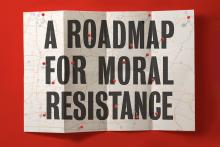
THE RIGHT TO VOTE, a foundation of our democracy and a fundamental attribute of citizenship, is under serious threat. In recent years, attacks on the integrity of the electoral system—the gutting of the Voting Rights Act, disinformation campaigns, foreign interference, and more—have weakened its overall infrastructure and cast doubt upon its results. Now we’re seeing repeated attempts, through propaganda and other means, to further undermine the system and discredit in advance the results of the 2020 election.
The president has attempted to co-opt real concerns about the upcoming election, claiming without evidence that it might be “stolen” as a result of fraud tied to vote-by-mail. His efforts deflect attention away from the ways that voter suppression efforts already underway pose a real danger, both to people seeking to exercise their hard-won right to vote and to the integrity of the electoral system itself.
As many have pointed out, there are numerous ways internal or external forces could call the results of the election into question: declaring a state of emergency that disrupts voting, delaying Election Day, interference by hostile foreign powers, tampering with voting machines or databases, and more. All of these represent legitimate threats, but perhaps the most likely scenario is that rampant voter suppression tactics impede enough voters in key battleground states to alter the presidential election outcome and which party controls Congress.
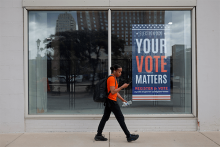
When we say the upcoming election is the most consequential election in our lifetime, it is not hyperbole or political spin, but a reflection of just how stark the choices have become and the perilous nature of the crises that our communities, our nation, and our world faces.

President Donald Trump still supports Anthony Tata, his pick for undersecretary of defense for policy, despite the abrupt cancellation of Thursday’s Senate confirmation hearing for the divisive nominee.
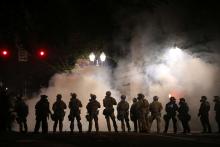
“As a community, we will resist such unconstitutional action by any morally rooted means we deem necessary,” said Rev. Dr. Otis Moss III. “We are a city of grit, grind and resistance, unafraid to speak truth to power.”
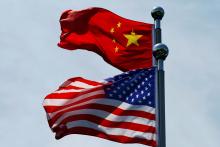
Communication between scientists in China and scientists in the U.S. has essentially shut down, eliminating opportunities for the U.S. to learn from China’s response to the virus.
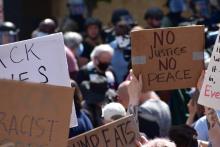
Eddie Glaude has rightly named the violent White House walk to St. John’s as “dictatorial theatre.” The words that came to mind for many of us were sacrilege and blasphemy. Here's the dictionary's definition of blasphemy: "Impious utterance or action concerning God or sacred things." Another word that came to mind was authoritarian. At the epicenter of political power in the United States stands a little church that Donald Trump has decided to violently use — and now St. John’s stands inside a police perimeter surrounding that seat of power.
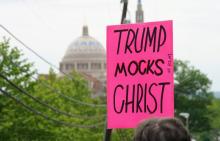
Editor’s Note : Amid nationwide protests following the police killing of George Floyd in Minneapolis, Minn., President Donald Trump on June 1 threatened in a Rose Garden speech that he would deploy military personnel to cities that refused to call out the National Guard. Following his announcement, police dispersed a peaceful protest outside the White House with tear gas and rubber bullets so the president could cross the park and pose in front of the historic St. John’s Church. Rev. Gini Gerbasi, rector at St. John’s Episcopal Church, Georgetown, about two miles west, had been at St. John’s Lafayette Square organizing aid for protesters that afternoon. This is her account of the events.
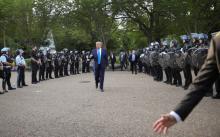
Last night, Donald Trump used and abused a church, and a Bible, as presidential props for a photo-op. In a violent and authoritarian act, the president of the United States took the space of a church and used a picture of a Bible to make a political move.
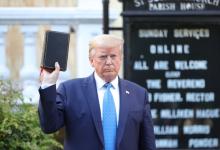
After an incendiary Rose Garden speech on Monday— in which he threatened to deploy the military if mayors and state governors refused to call out the National Guard to end protests of police brutality — President Donald Trump crossed Lafayette Park to pose for pictures while holding a Bible in front of the historic St. John Episcopal Church. Before his photo op, police used tear gas and rubber bullets to clear peaceful protesters from the park, which stands between the White House and the church.
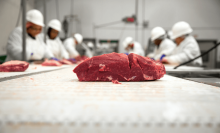
Yet history repeats itself – leaders are sacrificing lives to ensure an "uninterrupted food supply." These meat and poultry plants, just like cotton fields once were, have been deemed "critical infrastructure" to the nation's economy.
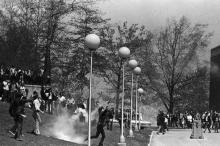
Monday, May 4, was the 50th anniversary of the Kent State shootings. Thirteen students were shot and four killed by the Ohio National Guard during a Vietnam War protest after the invasion of Cambodia. On that day, I was a student up the road at Michigan State University, helping lead Vietnam protests there. It all felt very personal. It still does.

Trump’s daily press briefings resemble the kind of public idolatry that ancient Caesars engaged in.

The likely death toll numbers confirmed this week by medical authorities as a result of the coronavirus pandemic are staggering.
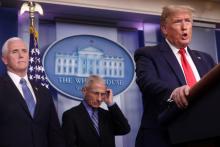
I suspect Trump thought I, a pastor, would be overjoyed by this news. After all, Easter is the most sacred day of the Christian year. It is the day we celebrate life over death and hope over fear. The thought of watching my congregation gather on Zoom for this holiest of days has left me sad and discouraged. I’ve silently mourned each week that my congregation cannot sing together, or share meals or hugs. Instead, we click a link to see each other’s faces appears in the grid of a computer monitor.

President Donald Trump pressed his case on Tuesday for a re-opening of the U.S. economy by mid-April despite a surge in coronavirus cases, downplaying the pandemic as he did in its early stages by comparing it to the seasonal flu.

We have failed to be good citizens. We have become complicit in the president’s nativism, racism, xenophobia, narcissism, and fearmongering.
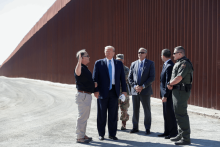
The administration is pursuing every tactic at its disposal – many of which have been temporarily stalled by the courts – to impede the path to citizenship and to reduce legal immigration avenues to the U.S.
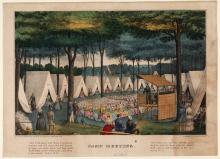
Last week, President Donald Trump spoke at the National Prayer Breakfast, an annual bipartisan event that brings together faith leaders and members of Congress. Using language like “I’ve been with you,” and “you better get out and vote on Nov. 3” — insinuating all those of faith gathered align with the president — Trump called once again on support from his most loyal followers: white evangelical Protestants.

At Thursday's National Prayer Breakfast, President Donald Trump kicked off his remarks by pointing to the "terrible ordeal" of impeachment, apparently taking aim at Sen. Mitt Romney (R-Utah), who voted to convict the president on the charge of abuse of power a day earlier, and House Speaker Nancy Pelosi (D-Calif.), who said recently she prays for the president.